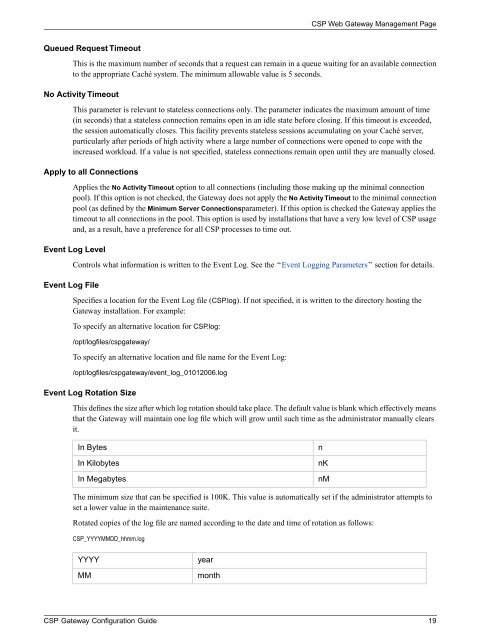CSP Gateway Configuration Guide - InterSystems Documentation
CSP Gateway Configuration Guide - InterSystems Documentation
CSP Gateway Configuration Guide - InterSystems Documentation
You also want an ePaper? Increase the reach of your titles
YUMPU automatically turns print PDFs into web optimized ePapers that Google loves.
<strong>CSP</strong> Web <strong>Gateway</strong> Management Page<br />
Queued Request Timeout<br />
This is the maximum number of seconds that a request can remain in a queue waiting for an available connection<br />
to the appropriate Caché system. The minimum allowable value is 5 seconds.<br />
No Activity Timeout<br />
This parameter is relevant to stateless connections only. The parameter indicates the maximum amount of time<br />
(in seconds) that a stateless connection remains open in an idle state before closing. If this timeout is exceeded,<br />
the session automatically closes. This facility prevents stateless sessions accumulating on your Caché server,<br />
particularly after periods of high activity where a large number of connections were opened to cope with the<br />
increased workload. If a value is not specified, stateless connections remain open until they are manually closed.<br />
Apply to all Connections<br />
Applies the No Activity Timeout option to all connections (including those making up the minimal connection<br />
pool). If this option is not checked, the <strong>Gateway</strong> does not apply the No Activity Timeout to the minimal connection<br />
pool (as defined by the Minimum Server Connectionsparameter). If this option is checked the <strong>Gateway</strong> applies the<br />
timeout to all connections in the pool. This option is used by installations that have a very low level of <strong>CSP</strong> usage<br />
and, as a result, have a preference for all <strong>CSP</strong> processes to time out.<br />
Event Log Level<br />
Event Log File<br />
Controls what information is written to the Event Log. See the “Event Logging Parameters” section for details.<br />
Specifies a location for the Event Log file (<strong>CSP</strong>.log). If not specified, it is written to the directory hosting the<br />
<strong>Gateway</strong> installation. For example:<br />
To specify an alternative location for <strong>CSP</strong>.log:<br />
/opt/logfiles/cspgateway/<br />
To specify an alternative location and file name for the Event Log:<br />
/opt/logfiles/cspgateway/event_log_01012006.log<br />
Event Log Rotation Size<br />
This defines the size after which log rotation should take place. The default value is blank which effectively means<br />
that the <strong>Gateway</strong> will maintain one log file which will grow until such time as the administrator manually clears<br />
it.<br />
In Bytes<br />
In Kilobytes<br />
In Megabytes<br />
n<br />
nK<br />
nM<br />
The minimum size that can be specified is 100K. This value is automatically set if the administrator attempts to<br />
set a lower value in the maintenance suite.<br />
Rotated copies of the log file are named according to the date and time of rotation as follows:<br />
<strong>CSP</strong>_YYYYMMDD_hhmm.log<br />
YYYY<br />
MM<br />
year<br />
month<br />
<strong>CSP</strong> <strong>Gateway</strong> <strong>Configuration</strong> <strong>Guide</strong> 19

















